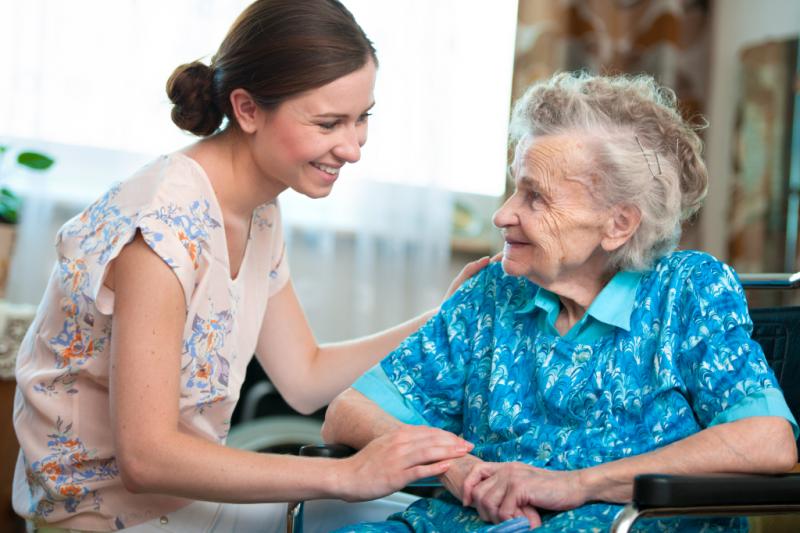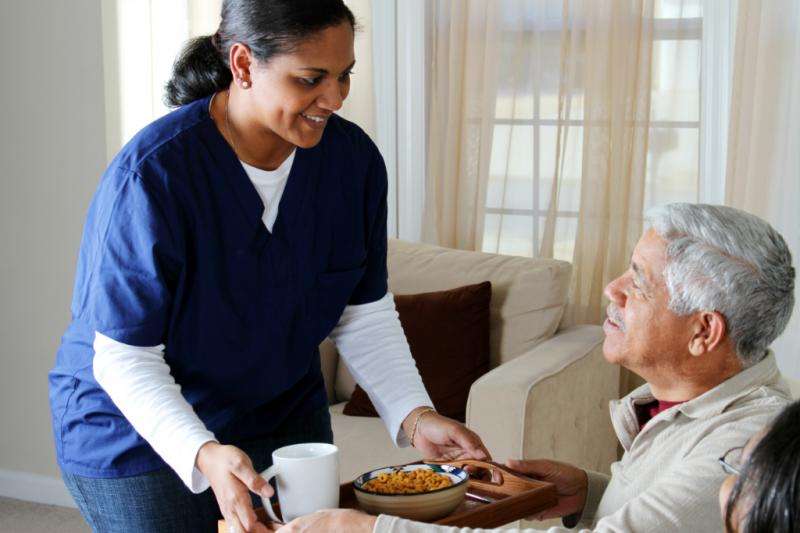5 Elder Care Best Practices For Caregivers

Old age is a susceptible phase of life. When people get to this phase, they need comfort and care to live a healthy life free of anxiety and worry. Increasingly, the role of providing elder care to senior citizens has been given to caregivers.
Elder care, also known as elderly care, refers to caregivers' services to senior citizens to fulfill their unique or special needs. These services include long-term care, assisted living, hospice care, nursing home, daycare, and home care.
In elder care, caregiving involves caring for the wellbeing and health of senior citizens who need assistance with their day-to-day tasks and activities. Senior citizens need this kind of care due to memory issues, mobility challenges, and chronic illness that make it challenging to undertake and manage their chores. Providing this care isn't always easy for caregivers.
However, there are various practices that caregivers can incorporate into their day-to-day routines to make their work easier. When hiring caregivers, people who enlist caregiving services for their loved ones also consider these practices critical.
If you're a caregiver, here are five elder care best practices you need to nurture:
- Invest In An Ongoing Training
Learning is critical for caregivers. Successful caregivers understand that there's no end to learning new care techniques and skills because caregiving is constantly evolving. As a caregiver, you can stay abreast of changes happening in the caregiving field by reviewing simplified reports on websites dedicated to advances in elder care. Skimming through the content published on these websites daily is sufficient to keep you updated on the best practices in senior care.
Another way to keep learning about elder care is to enroll in senior care education classes, most of which can be completed online. Such courses may be available in local community colleges, public health departments, and home care providers. Taking senior care classes is a great way to sharpen your caregiving skills.

- Maintain A Positive Attitude
Another elderly care practice that caregivers should nurture is maintaining a positive attitude. This entails being willing to step out of their comfort zones to provide eldercare. To achieve this, caregivers need to develop perseverance and passion for following through with their goals.
By maintaining a positive attitude, caregivers develop a mindset that encourages learning and the willingness to try new things. Their passion for the job also allows them to work with families and home care agencies to find the best solutions for senior citizens under their care.
- Cultivate Good Communication
Caregivers who successfully provide care to the elderly are great communicators. This elder care best practice is critical for caregivers because their work involves sharing observations and details of behavior, mental, and physical changes that seniors under their care exhibit.
People who hire primary caregivers to take care of their beloved senior citizen families often consider this trait extremely essential in primary caregivers. As a caregiver, you can nurture this best practice by maintaining a daily log highlighting medication reminders, activities, and crucial observations.
- Maintain Proper Lifting Abilities
Most senior citizens need help and support to move or stand due to impaired mobility. This makes proper lifting a critical best practice for primary caregivers to develop. Improper lifting of the client can result in multiple health problems that last for a lifetime.
Suppose you have a client with impaired mobility. In that case, you need to get a caregiver who has developed proper lifting and transfer techniques to keep your loved one from getting injured. Some caregivers use gait or transfer belts to lift or transfer the elderly under their care.
As a caregiver, you can boost your patient lifting abilities by practicing proper use of gravity and lifting with the elbows and knees. The best caregivers avoid lifting their clients with their back muscles and get training in lifting equipment to prevent accidents.
- Exercise Self-Care
As they provide care for the elderly, caregivers need to take care of their emotional and physical needs to prevent burnout, mental or physical health problems. This means getting quality sleep, maintaining healthy relationships, exercising, and engaging in healthy activities like hobbies.
Self-care can also mean reaching out for help, meditating, and taking breaks to rejuvenate. Caregivers can join local elder care organizations offering professional support, advice, or assistance to help them make decisions. Exercising self-care enables caregivers to be in the right emotional and mental state to take care of their clients.
Applying Best Practices In Caregiving Responsibilities
Caregiving responsibilities range from planning for senior care to assessing medical needs and providing companionship to the elderly. Caregivers can apply the best practices discussed above in their duties on a day-to-day basis. Below are the primary responsibilities of caregivers and the opportunity they present to apply best practices:
- Developing A Senior's Care Plan
Caregivers are responsible for developing a care plan for the seniors under their care. A suitable care plan should be customized to the needs of an individual senior citizen to help with the caregiving journey.
This makes it easier to determine whether additional help would be required to keep their loved ones safe and healthy. Ongoing training enables caregivers to be updated with new developments in the caregiving industry, allowing them to apply the latest knowledge in senior care planning.
- Assessing The Medical Needs Of The Elderly
When providing elder care, caregivers are expected to assess senior citizens' medical needs regularly. This includes managing their chronic illness, administering medication, keeping tabs on medical appointments, and assessing pain levels. In some instances, caregivers periodically discuss the health of their clients with their family members and health professionals.
To undertake this role effectively, caregivers must communicate well with the elderly and maintain a positive attitude to learn new things about their clients. Further, embracing continuous learning puts them in a better position to assess their patient's medical needs and take note of any changes.
- Helping The Elderly With Basic Needs
Senior citizens are prone to mobility and memory issues that make it challenging to undertake fundamental activities without assistance. Caregivers provide the elderly with the help they need to undertake activities of daily living like feeding, bathing, toileting, and grooming.
Family members and caregivers should pay attention to changes and signs in their clients to know when they need extra help doing various basic activities. Practicing a positive attitude, good communication, proper lifting ability, and dependability would enable caregivers to perform these tasks effectively.
- Offering Companionship
The other vital responsibility that caregivers have towards the elderly is providing companionship. Although this role is essential for the elderly, it's often overlooked in caregiving. Senior citizens experience loneliness that can lead to severe health conditions like depression.
When you take care of an elderly person, you create an opportunity to connect and bond with them. This companionship offers them the comfort they need to go through this phase of their life. For this caregiving role, being dependable in a way that prioritizes the wellbeing of the elderly is vital. Caregivers can enhance their success in caregiving by maintaining a positive attitude and communicating well with the elderly under their care.
- Assisting With Housekeeping And Food Preparation
Another necessary task that caregivers undertake for the elderly is housekeeping and food preparation. Senior citizens experience difficulties maintaining their homes and often need help cleaning dishes, vacuuming, and taking the garbage out.
When an elderly person lives in a house, the tasks extend to snow shoveling, yard work, and maintenance. In addition, senior citizens who live alone need help to prepare meals since they might lack the motivation or energy to cook. In some instances, balance and memory loss can make cooking challenging and unsafe for them.
Caregivers help with shopping for groceries, preparing food, and ensuring the elderly under their care have nutritious food. The most successful caregivers maintain a positive attitude in performing these tasks.
- Administering Medications
The majority of senior citizens have several prescribed medications they must take to manage or treat chronic illnesses. Caregivers have the responsibility of ensuring they take the medications as prescribed by the doctor. This means giving the elderly under their care the prescribed dose at the right time.
Further, caregivers must understand how the drugs interact and can take note of any changes in the patient. This role requires caregivers to practice good communication, ongoing learning, dependability, and a positive attitude.
- Assisting With Transfer Or Mobility
Falls pose a serious risk to the health of elderly adults, causing them to experience difficulties transferring or moving from one place to another. For instance, transferring from the bed to the chair can be difficult without help. Caregivers help with this by lifting or supporting seniors to move or transfer safely and comfortably by practicing proper lifting and maintaining a positive attitude.
Final Thoughts
As people get old, they experience a wide range of health problems including mobility challenges, memory problems, and chronic illnesses. These problems make it difficult for them to take care of their needs. Caregivers help them to live comfortably and safely. However, caring for the elderly isn't always easy. But, as a caregiver, applying the five practices discussed above can help you work more efficiently.
More to Read:
Previous Posts:
Next Posts:




